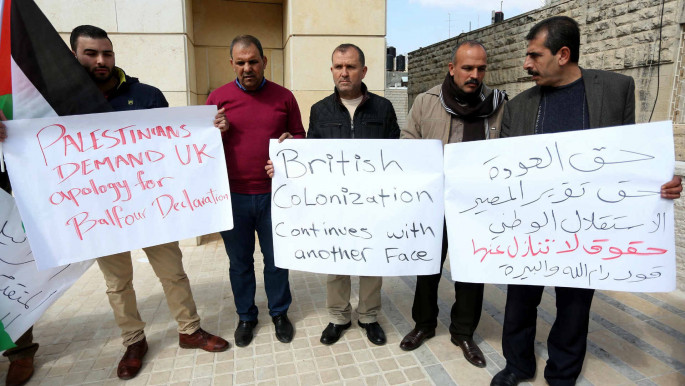
100 years of murderous injustice: Marking Balfour with BDS
The declaration, made by the British government during World War One, endorsed "the establishment in Palestine of a national home for the Jewish people". It also declared "nothing shall be done which may prejudice the civil and religious rights of existing non-Jewish communities in Palestine" - reducing the indigenous Palestinian population to nondescript 'non-Jewish populations' in one slight of the pen. A century later, it couldn't be clearer that the latter part has actively been neglected.
Just last week, Israel was condemned for the deteriorating humanitarian conditions of Palestinians in East Jerusalem, the West Bank and the Gaza strip in a new UN report. The text listed among the violations the theft of natural resources, high unemployment and a weakened Palestinian economy over the course of a 50-year old occupation.
"For the Palestinian people, these were five decades of de-development, suppressed human potential and denial of the basic human right to development, with no end in sight," the report by the United Nations Conference on Trade and Development (UNCTAD) reads.
 |
Only one course of action - Boycott, Divestment, Sanctions |  |
Earlier this year, a renegade undersecretary-general at the UN was forced to resign for a report accusing the Israeli state of running "an apartheid regime that oppresses and dominates the Palestinian people as a whole".
These reports highlight the violations of international law and basic human rights that the Palestinians have long been resisting. The second report even called for international governments to "support boycott, divestment and sanctions (BDS) activities and respond positively to calls for such initiatives".
 |
|
| [Click to expand] A protest in Ramallah against the Balfour Declaration [Anadolu] |
This call for solidarity was previously made in 2005 by a consortium of 170 Palestinian unions, and other political organisations including refugee networks, women's organisations, professional associations, popular resistance committees and other Palestinian civil society bodies.
The demands are clear:
-
End Israel's occupation and colonisation of all Arab lands and dismantle the Wall.
-
Recognise the fundamental rights of the Palestinian citizens of Israel to full equality, as well as respecting, protecting and promoting the rights of Palestinian refugees to return to their homes and properties as stipulated in UN Resolution 194.
BDS campaigns have been gaining widespread support since they started using tactics seen in the South African anti-apartheid struggle. The UK government however, has consistently attempted to curtail such developments by even attempting to ban local town halls from enforcing boycotts.
Read more: Gulf states 'offer Israel normalised ties for peace concessions' |
|
These attempts stand in the long tradition of the British state's complicity in the expropriation and oppression of the Palestinian people, which started with the Balfour Declaration. Indeed, despite the continued annexation of Palestinian land, the largest refugee population in the world, the siege of Gaza, the continued extension of illegal settlements and the numerous laws specifically targeting Palestinian citizens in Israel, our government continues to stand by Israel and has even facilitated Israel's access to arms.
In this context, it is perhaps unsurprising that this same government is actively refusing to recognise let alone apologise for the Balfour Declaration. Instead our leaders are amongst those celebrating this part of history. A hundred years down the line, British politicians celebrate the UK's role in laying the foundations for one of the world's most long-lasting conflicts, as well as the displacement and dispossession of millions.
| Read more: Balfour Apology Campaign: An impossible goal? | |
For these reasons, it is up to us to build an alternative centenary - one which recognises the wrongs of the past and looks towards justice and liberation for the future. The solidarity we build through the continued support and implementation of BDS in our local councils, students' unions, universities, colleges, workplaces and trade unions is crucial. The centenary of the Balfour declaration is an important opportunity to strengthen our efforts and actively make clear that we condemn the crimes of our leaders - both historic and contemporary.
Twitter Post
|
Opposition to our movement in the UK is strong - from official institutions to the government. Several BDS events have been threatened or cancelled, while character assassinations have been attempted against pro-Palestine activists. Policies being reversed by trustees in education institutions, all of which is being normalised under the prevent duty.
The state-led efforts to shut solidarity down are growing because momentum is also building globally. The reports themselves are a clear indication of that.
That powerful institutions and establishments such as the UN are increasingly comparing Israel's treatment of Palestinians to apartheid policies shows the effects of the grassroots movement led by the Palestinians. Whilst we've witnessed the aggressive targeting of Israeli Apartheid Week across campuses and local communities, by Parliament and the Charity Commission, its significance is only strengthening.
Let's mark this centenary by bringing to the fore 100 years of colonial dispossession, expulsion, and oppression against the people of Palestine and by building the grassroots resistance to it. As the slogan goes: Only one course of action - Boycott, Divestment, Sanctions.
Malia Bouattia is an activist, the former President of the National Union of Students, and co-founder of the Students not Suspects/Educators not Informants Network.
Follow her on Twitter: @MaliaBouattia
Opinions expressed in this article remain those of the author and do not necessarily represent those of The New Arab, its editorial board or staff.





 Follow the Middle East's top stories in English at The New Arab on Google News
Follow the Middle East's top stories in English at The New Arab on Google News


